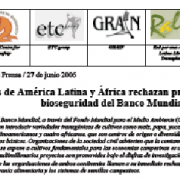Monsanto anuncia la compra de Delta & Pine Land y Terminator
Soumis par ETC Staff le
Siguiendo con la expansión de su imperio corporativo en semillas —Monsanto, la empresa semillera más grande del mundo—anunció ayer que adquirirá por 1500 millones de dólares la mayor empresa de semillas de algodón del globo, Delta & Pine Land, basada en Mississippi (Estados Unidos). Juntos, Monsanto y Delta & Pine Land (D&PL) controlan más del 57% del mercado de semillas de Estados Unidos. Con las subsidiarias de D&PL en 13 países —incluyendo grandes mercados como China, India, Brasil, México, Turquía y Paquistán— esta operación significa que Monsanto tendrá una posición dominante en una de las commodities más importantes del comercio agrícola, y que millones de agricultores de algodón sufrirán una mayor presión para que aceptar semillas de algodón transgénico.

